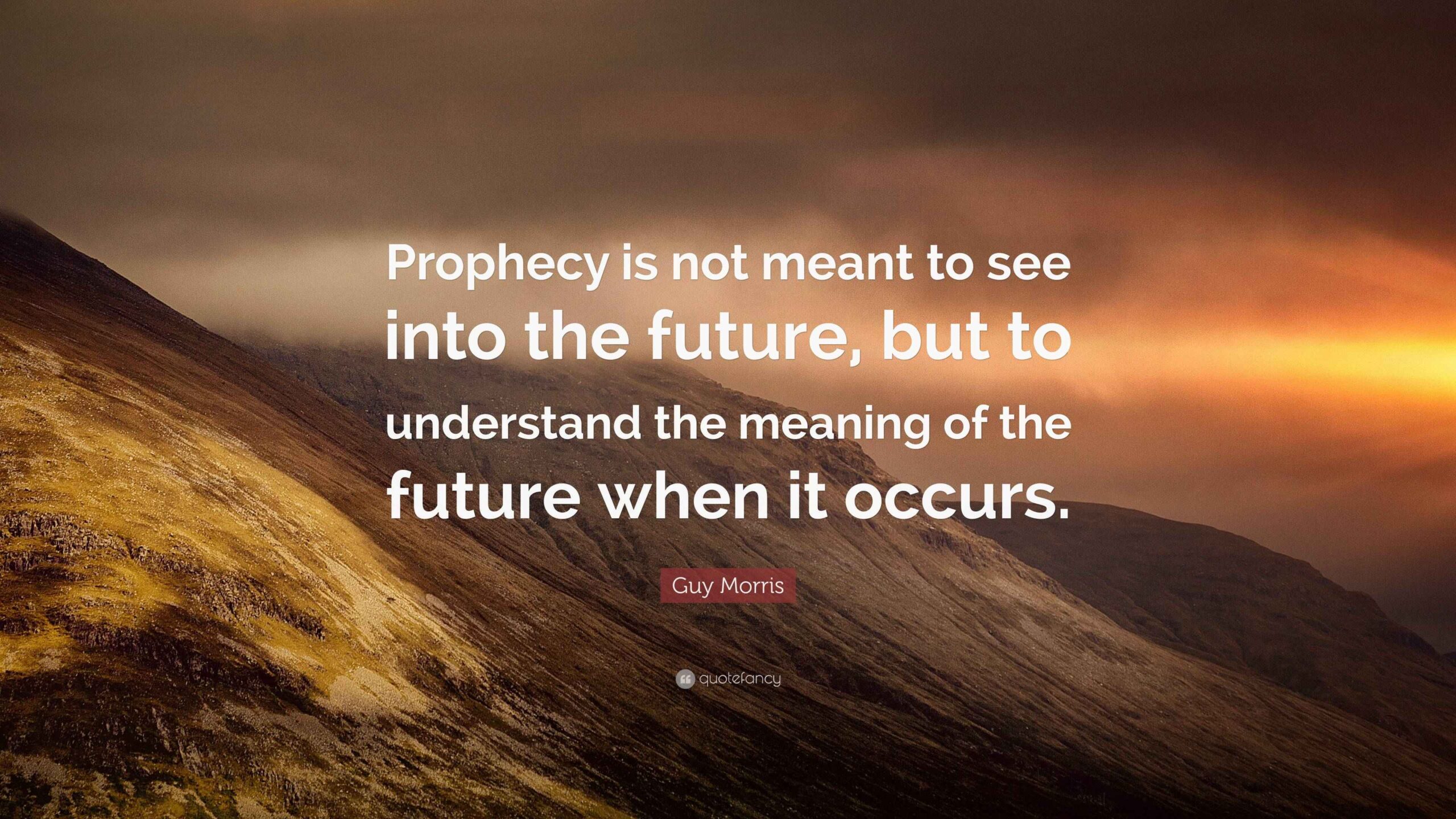The concept of prophecy is perennial, echoing through various cultures and religious traditions, offering tantalizing glimpses into the unknown. In the Bahá’í Faith, the understanding of prophecy transcends mere fortune-telling or predicting future events; it embodies a profound spiritual principle. The Bahá’í teachings elucidate that prophets possess a unique capacity to perceive not just linear sequences of future events but the spiritual evolution of humanity. This essay delves into the nuances of prophetic vision within the context of Bahá’í teachings, illuminating how prophets engage with the future and the implications of their insights for humanity.
At the heart of Bahá’í beliefs is the understanding that prophets, or Manifestations of God, serve as divine intermediaries. These figures, including Abraham, Moses, Jesus, Muhammad, and Bahá’u’lláh, comprehend the world through a spiritual lens, which is inherently different from human perception. Within the Bahá’í framework, prophecy is a multifaceted phenomenon, emphasizing moral and ethical guidance alongside mere foresight. This distinction is crucial; rather than focusing solely on predicting cataclysmic events, prophets illuminate pathways for human advancement, urging individuals to embrace virtues and foster unity.
One of the most notable aspects of prophecy in the Bahá’í context is its emphasis on the progressive revelation of truth. Bahá’ís believe that spiritual truth is not static but evolves as humanity matures. Each prophet brings teachings that address the specific needs and conditions of their time, yet they all point towards a unified vision of humanity’s destiny. This continuity and evolution in prophetic teachings reveal a grand narrative that transcends individual predictions. It beckons humanity toward a collective future grounded in justice, peace, and cooperation.
The deep fascination with prophecy often stems from the human desire to comprehend the unknown. This yearning for knowledge about the future, for answers beyond the immediate, is intertwined with existential questions. Prophets address this need not by providing explicit timelines or detailed forecasts but by imparting a broader understanding of human purpose and agency. Their revelations compel individuals to reflect on their actions and decisions in the present, thus shaping a more favorable future through conscious and ethical living.
This dual temporal engagement—where past teachings influence present actions to mold the future—underpins the Bahá’í interpretation of prophecy. According to Bahá’í writings, the essence of prophetic insight is found in its capacity to inspire transformation both at individual and societal levels. The prophetic message serves as a clarion call for humanity to awaken to its potential, to engage in collective endeavors that uphold justice and equity, and to cultivate a global civilization that recognizes the unity of all peoples.
Furthermore, the nuances of prophetic vision in the Bahá’í Faith extend to the concept of human agency. Unlike fatalistic interpretations of prophecy, which imply a predetermined future, Bahá’í teachings emphasize that the future is shaped by human actions. The Manifestations, while having foresight, encourage individuals to take an active role in the world. They bestow the tools necessary for human beings to engage in the betterment of society, urging upon them a sense of accountability for the direction in which humanity progresses. This empowerment transforms individuals from passive recipients of prophetic predictions into active participants in their destiny.
The enduring fascination with prophecy can also be attributed to the manner in which it invites individuals to engage with profound questions about existence. Prophetic utterances challenge adherents to ponder their role in the cosmic order and to consider the implications of their choices. Each prophetic revelation is imbued with depths of meaning, begging for exploration and contemplation. This encourages adherents to delve deeply into the significance of justice, equity, and spiritual development—themes that resonate throughout human history.
In this light, Bahá’í teachings position prophecy as a dynamic dialogue between the divine and humanity. Prophets don’t merely foretell events; they articulate visions that reflect the spiritual aspirations of society. Their messages often resonate in cycles, revisiting essential truths in a manner that reflects contemporary challenges. This cyclical nature of divine guidance fosters a sense of hope, suggesting that regardless of the trials faced by humanity, the fundamental principles of love, unity, and justice remain steadfast.
This ongoing dialogue is also reflective of the interconnectedness of all teachings, demonstrating that the principles laid forth by past prophets remain relevant in contemporary society. One can observe the prophet’s insights weaving through the tapestry of human experience, guiding conversations on social justice, moral integrity, and communal harmony. The teachings of Bahá’í thus provide a profound commentary on the essence of prophecy—not merely as future-gazing predictions but as an invitation to build a better world.
In conclusion, the Bahá’í understanding of prophecy invites a reevaluation of familiar notions, imbuing the concept with a depth and complexity that goes beyond mere prediction. It highlights the transformative power of the prophetic mission, emphasizing that the future is not merely something to be revealed, but something to be created through the ideals of justice, unity, and love. In this way, the teachings urge humanity to engage actively with its destiny, interacting meaningfully with the shared vision of peace and collaboration, as envisioned by the prophets throughout history.
